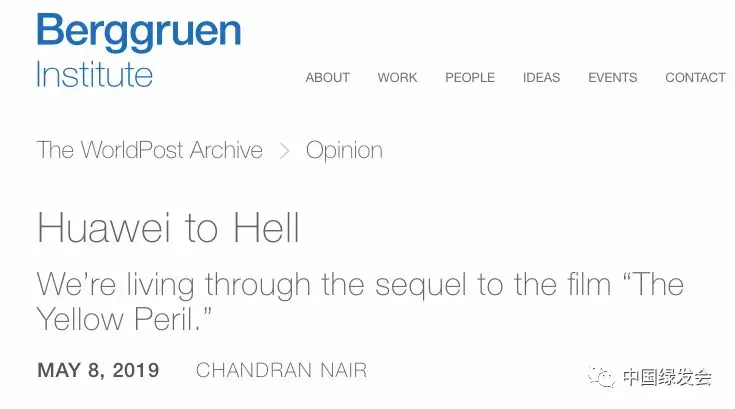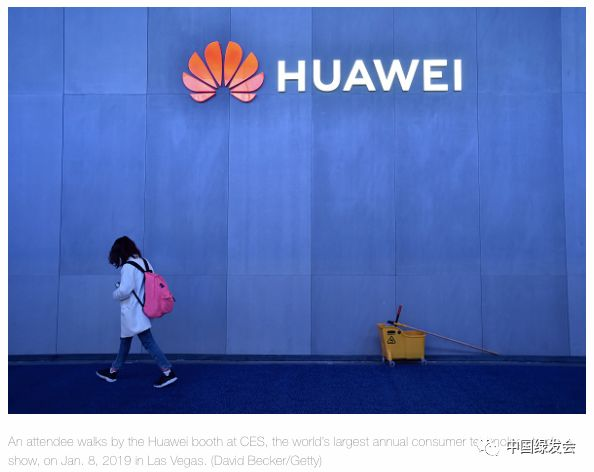译者按:全球明日研究所创始人兼首席执行官、罗马俱乐部成员Chandran Nair先生,近日与中国生物多样性保护与绿色发展基金会秘书长、罗马俱乐部成员周晋峰博士分享了他的《Huawei to Hell! We're Living Through the Sequel to the Film “The Yellow Peril.”》一文。

图1: Chandran Nair先生剖析华为产品被排斥背后的西方心理,来源:网络
Nair先生用反讽的笔法,从西方对华为产品的质疑着眼,类比日本东芝历史案例,分析中美贸易谈判、人民币被低估与否、华为产品威胁观点等背后的西方竞争、排斥心理。其笔触幽默风趣,剖析淋漓尽致,表达了对西方的排外心理的不满。现将原文翻译、分享如下。

图2来源,网络
编译/卢蕾 审核/Linda 编/Angel
再见华为!我们正在经历电影《黄祸》的续集
日期:2019年5月8日
作者:Chandran Nair

图3:电影《黄祸》(1984)海报。这部电影主要情节:美国唐人街由于越南难民的涌入,形势更加复杂。当局对此更为关注和恐惧,遂暗中策划"以华制华"政策。一日,的士司机关志华突遭越青帮袭击,关与同伙准备报仇。当他们赶至越青帮聚集地时,发现对方全已遭毒手。警方接报后将此地包围,关被当成凶手为警方通缉,他只好潜返香港暂避。美警方追至香港,关再陷杀机之中。关从律师口中得知此乃政治阴谋。由于关的机智勇猛,越青帮没能奈何他,却捉走他的妻儿作人质迫他投降。关在澳门与越青帮交换人质时爆发了一场血战,他虽救出了妻儿,但料到今后的日子仍将陷于荆棘之中。 来源/豆瓣
作者简介:Chandran Nair先生是全球明日研究所的创始人兼首席执行官,著有《可持续状态:政府、经济和社会的未来》一书。
When you have keenly followed the reaction of the West to the rise of Asia over the years, you find yourself inclined to moments of clarity that go like this: “Haven’t I seen this movie before?”
当人们多年来密切关注西方对亚洲崛起的反应时,有时会反问自己:“我以前没看过这部电影吗?”
The movie, in this case, is “The Yellow Peril.” Are you now enjoying its sequel, “Huawei to Hell”?
这里所指的电影,就是《黄祸》。你现在喜欢它的续集 —《再见华为》(Huawei to Hell)吗?
One of the good things about being a student in an Asian university during the Cold War was the access to newspapers from the bourgeois, liberal West. It was interesting to note how Asia and its future were viewed by Americans, especially those who never seemed to really integrate or want to be part of a new phase of history written by Asia, particularly if it departed from their peculiar worldview.
我曾在“冷战”的年头在亚洲一所大学念书,近水楼台的一个好处是,当时能够接触到自资产阶级、自由主义西方的报纸。分析美国人如何看待亚洲及其未来,是非常有趣的;尤其是那些似乎从未想过真正融入或成为亚洲书写的历史新阶段的美国人。而且,当亚洲偏离了他们独特的世界观时,他们如何看待亚洲及其未来,就更加有趣了。
In 1987, for example, a Toshiba subsidiary sold milling equipment to the Soviets, allegedly to make quieter submarine propellers, raising fury in Washington. A group of U.S. congressmen and women, apparently unable to get their hands on a submarine propeller, gathered in front of the Capitol and used sledgehammers to smash a Toshiba boombox. Take that, Tojo.
在1987年,当时东芝(Toshiba)的一家子公司向苏联出售铣削设备,据称是为了制造噪音更小的潜艇螺旋桨,这在华盛顿引起了愤怒。一群显然与潜艇螺旋桨毫无关联的美国国会议员,聚集在国会大厦前,用大锤砸坏了一台东芝的录音机。
In many ways, nothing has changed. When it comes to “yellow peril,” Democrats and Republicans are united. It’s probably just a matter of time before the sledgehammers come out to do battle with Huawei smartphones or WiFi routers. That’ll show ‘em who’s boss.
在很多方面,一切都没有改变。谈到“黄祸”,民主党人和共和党人的团结,是空前一致的。是否用大锤砸坏华为的智能手机或WiFi路由器,可能只是时间问题。到时候,他们就知道谁可以做主了。
Consider that in the years leading up to the end of the Cold War, opinion polls in the United States revealed that more Americans feared the economy of Japan — their ally — than the Soviet Union. Politicians of both parties regularly set aside their differences and joined together in hate against Japan. Walter Mondale, Jimmy Carter’s vice president who ran against Ronald Reagan in the 1984 election, took some swings at Japan that were just as good as Reagan’s. Interestingly, Mondale used very Trumpian lines about Japan stealing the jobs of good middle-class Americans. Bill Clinton later made Mondale the U.S. ambassador to Japan.
在冷战结束的前几年里,美国的民意调查显示,相比苏联,美国人更担心日本 — 他们的盟友 — 的经济。两党政客经常摒弃前嫌,联合起来抵制日本。曾在1984年总统大选中与罗纳德?里根(Ronald Reagan)竞争的吉米?卡特(Jimmy Carter)的副总统沃尔特?蒙代尔(Walter Mondale),他对日本的某些攻击,与他对里根的某些攻击,非常类似。有趣的是,蒙代尔采用了非常特朗普式的言辞,称日本偷走了优秀的美国中产阶级的工作。比尔·克林顿后来任命蒙代尔为美国驻日本大使。
In 1985, two years before the submarine propeller fracas, an agreement called the Plaza Accord was signed. Japan — an evil currency manipulator! — had come under enormous pressure from the West and was forced to boost the value of its currency against the U.S. dollar. It seemed Japan’s foes weren’t so much upset about currency manipulation per se but rather the direction of the manipulation, and this revaluation would solve a huge trade imbalance.
1985年,在潜艇螺旋桨发生的两年前,《广场协议》(Plaza Accord)签署。日本—这一位邪恶的货币操纵者!—受到来自西方的巨大压力,被迫提高日元兑美元汇率。日本的世仇似乎并不是对汇率操纵本身感到不安,而是对操纵的方向感到不安,而日元升值将有助于解决巨大的贸易失衡问题。
It was heresy to bring up the fact that Japan’s automotive and electronics manufacturers had out-engineered and out-designed Americans and reached levels of quality control that the U.S. industry could only dream of. No, it was the cheap yen causing all the problems. (That boombox was very well-made.) The same is happening now to Huawei as its products become superior. The irony is that the Japanese are now on the side of the Americans.
宣称日本的汽车和电子产品,在生产和设计上超过美国,甚至到达美国相关行业梦寐以求的水平,这是异端邪说。不,廉价的日元,才是所有问题的症结所在。(那个录音机是做得不错。) 随着华为的产品变得越来越优秀,同样的事情也发生在华为身上。具有讽刺意味的是,日本现在站在了美国一边。
By no small coincidence, Japan’s decline began just around the time of the Plaza Accord. By the 1990s, Japan was well into its “lost decade.” The 2000s and the 2010s haven’t been much better. But fear not: Japan’s ebbing has corresponded with China’s rise so there’s an even better “other” to blame problems on. They’re not American allies, and dang it if they ain’t commies too. What a perfect storm. Where’s my sledgehammer?
日本的衰落,开始于《广场协议》签署前后,这绝非偶然。到上世纪90年代为止,日本已经进入“失落的十年”。在本世纪的前10年,情况依旧不容乐观。可是,无需担心:日本的衰落,与中国的崛起是同步的。所以,还有一个更好的替罪羔羊。他们不是美国的盟友,甚至可能是共产党员。多么完美的攻击对象。我的大锤在哪里?
Remember the Plaza Accord amid the current trade talks under way between China and the United States. Remember Toshiba when Huawei is accused of being a security risk, even though in the more genteel 1980s, the two sides didn’t take hostages.
请注意,当前中美贸易谈判中达成的《广场协议》。尽管在更为文雅的上世纪80年代,东芝(Toshiba)曾指控华为(Huawei)存在安全风险,双方并未挟持人质。
Don’t get me wrong: none of this means that the Chinese yuan isn’t undervalued or that Huawei isn’t a possible threat. But so are Facebook and Google. These are symptoms, not causes, of the problem. The problem, to put it bluntly, is that the leader of the free world is freaking out because it is being challenged technologically by a nation that was dirt poor a generation ago. After all, in 1987, China’s gross domestic product was smaller than Spain’s. For the first time in centuries, the West, led by the United States, is being challenged by others who, a mere generation ago, were viewed as backward and inferior.
当然,我并不是认为,人民币没有被低估,或华为不可能构成威胁。但Facebook和Google,处境类似。这些只是问题的症状,而不是症结。坦率地说,问题在于,这个自由世界的领导者之所以会坐立不安,是因为在技术上,它正受到不久前还极度贫穷的国家的挑战。毕竟,1987年中国的国内生产总值(GDP)还不及西班牙。几个世纪以来,以美国为首的西方世界第一次受到了其他国家的挑战;而就在一代人之前,这些挑战者,落后和低人一等。
I recently met an American who works in China. I floated the idea that this current flap was because the train was leaving the station and the Americans feared being left behind. “No, no,” he said. “Not only did the train leave the station hours ago, we are envious because their trains are so much better and faster. They connect the entire country, yet we do not have a single one like that. And now they are going to take on some of our jewels, like Boeing, as they make planes too.” Watch the skies.
我最近遇到一位在中国工作的美国人。我提出,目前的混乱局面,是因为火车即将离开车站,而美国人害怕被甩在后面。“不”,他说,“火车在几个小时前,就离开了车站。我们更羡慕,他们的火车比我们的好,速度也快得多,贯通整个国家,我们没有与此相近的火车。现在他们正在涉及我们的一些特色,比如波音,因为他们也生产飞机。”
Anyone in tech will tell you that visiting China is sobering. The leaps being made in areas like machine learning, artificial intelligence, big data, cloud computing, agricultural technology and 5G are stunning. Again, as was the case in Japan, there are those who say this success springs merely from the mobilization of an army of idea-less individuals, that it’s driven by stolen Western intellectual property. Have there been intellectual property violations? Of course. Industrial espionage is as old as the hills. Is it the primary reason for China’s success? Nonsense.
科技界的从业人员,在到过中国后,都会感到警醒。最新技术,例如机器学习、人工智能、大数据、云计算、农业技术和5G等的飞跃,令人震惊。再一次,如同日本的情况,有人说,这种成功仅仅来自于动员一支由缺乏创意的个人组成的军队,这支军队只是通过窃取西方的知识产权,获得发展。是否存在侵犯知识产权的行为?当然。工业间谍,由来已久。但这是中国成功的主要原因吗?无稽之谈。
The biggest difference between Japan then and China now? The United States was able to put Japan back in its box. That’s not happening this time. The bully has met its match, and the bully is very uncomfortable. Given the bully’s penchant for lashing out, this is also troubling for the world.
日本过去与中国现在,最大的不同是什么?美国能够使日本回到一定范围之内。中国不是。棋逢对手,美国感到不安。而其恃强凌弱性质的猛烈抨击,也在给世界造成困扰。
Oh, one last thing about those Soviet propellers made with Japanese tools. Not even a year after the boombox was massacred, Richard Armitage, then assistant secretary of defense, admitted that “the Soviets had quiet propellers three years before” Toshiba sold them anything.
最后提一下苏联用日本工具制造的螺旋桨。在录音机事件发生不到一年后,当时的美国国防部助理部长理查德·阿米蒂奇(Richard Armitage)承认:“苏联在三年前就有过静音螺旋桨,早在东芝向他们出售任何产品之前。”
Popcorn, anyone? Or how about some dried, salted duck tongues from Sichuan?
来点爆米花,如何?或者来点四川盐水鸭舌?
原文链接:
https://www.berggruen.org/the-worldpost/articles/huawei-to-hell/


